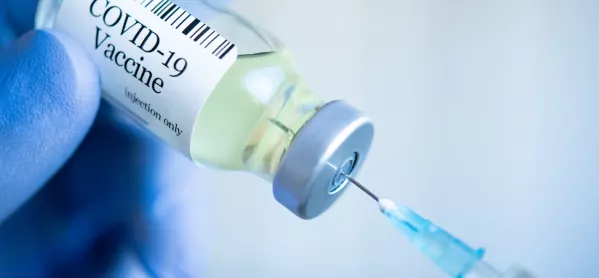
Partial vaccination of ASN staff ‘puts pupils at risk’

Scotland’s biggest teaching union is calling for a “broader interpretation” of government guidance when it comes to special needs staff receiving vaccinations, warning that sometimes staff working in the same buildings and classrooms are being refused the jab while their colleagues receive it.
EIS general secretary Larry Flanagan said that “many” school staff working with children with complex needs in Scotland had now been vaccinated. However, he added that some teachers and support staff were being passed over, despite the fact they worked in the same buildings, and sometimes in the same classrooms.
He said that failing to vaccinate all the staff working in a building was out of line with what had happened in clinical and care settings, and was creating “a greater risk in the setting” for children.
Background: ASN teachers call for blended learning over Covid fears
Related: Some special school staff to be prioritised for vaccine
News: No sign yet that teachers will get vaccine priority
Earlier this month, Scotland’s education secretary, John Swinney, said that school staff working with children with complex needs who were “undertaking tasks that are essentially health and social care-style activity” would be prioritised for vaccination, after coming under pressure from staff in the sector.
Coronavirus: Call for vaccination of ASN staff
Mr Flanagan said: “People are entitled to be vaccinated if they are in very close contact with children with specific needs with the aim of protecting the child. But the issue that has resulted in in some ASN settings is some teachers and support staff are being vaccinated, and others are not.
“We have challenged that because if you look at the vaccination of staff in hospitals and clinical settings and social care settings, that involved everybody in the building.
“Everyone in a school building is potentially in contact with that child. We have argued there should be a broader interpretation of the guidance and have raised the issue with [local authorities’ body] Cosla.”
ASN settings tend to be quite small, so vaccinating all staff in a building would not have a big impact on vaccine supply, Mr Flanagan argued.
“It would not increase demand that much,” he said. “This type of ASN setting is not huge and so staffing numbers are not normally big. There are one or two secondary ASN settings but most are all-through and quite small in terms of staffing numbers.
“We think this would be very manageable and that failing to vaccinate all staff creates a greater risk in the setting.”
Teaching unions have argued that all teachers should be prioritised for vaccination, given plans to return to face-to-face teaching - but the Scottish government has said, while prioritisation by occupation could happen in the second wave of vaccinations, it is waiting for advice from the Joint Committee on Vaccination and Immunisation (JCVI).
However, on 3 February, while giving evidence to the Scottish Parliament’s education committee, Mr Swinney said the government had written to education directors asking them to identify the staff that were undertaking tasks in relation to the support of young people with complex needs that were “essentially of equivalence to health and social care-style activity”, so that they could be included in the group of staff who, already under JCVI criteria, are eligible for the vaccine.
ASN staff working with children with complex needs had questioned why they were not being prioritised when they provide personal care for pupils, medical care and assisted feeding.
In the letter sent to education directors, the Scottish government said that staff should be offered the vaccination if they are supporting children with “the most complex healthcare needs”. It said the move was designed to protect children under 16 who were at increased risk from Covid-19 but could not receive the vaccination.
It said staff working “in special schools and units, and in some cases in mainstream schools” could be included. The letter added: “It is expected that the support provided must be over and above the routine processes of feeding, washing and toileting.”
It said the type of clinical interventions being undertaken by staff may include:
- Emptying colostomy bags.
- Cleaning sputum from tracheostomy sites.
- Replacing the ‘speaky’ cap.
- Monitoring infections and cleanliness of gastrostomy and stoma sites.
- Mopping up spills from gastrostomy and bile bags.
- Monitoring requirements for suctioning, which requires to be in very close contact.
- Monitoring and responding to epilepsy seizures and safety management, reporting and recording.
- Moving and handling post-op.
- Moving and handling of brittle bones.
- Supporting positioning and 24-hour postural management and respiratory difficulties.
- Following identified physiotherapy programmes - eg, passive stretching, rebound therapy, respiratory health.
- Placement of orthotics.
- Monitoring of oxygen ventilation/saturation levels.
- Monitoring of pupil temperatures.
- Delivery of identified direct close contact SLT programmes.
- Delivery of identified OT programmes.
You need a Tes subscription to read this article
Subscribe now to read this article and get other subscriber-only content:
- Unlimited access to all Tes magazine content
- Exclusive subscriber-only stories
- Award-winning email newsletters
- Unlimited access to all Tes magazine content
- Exclusive subscriber-only stories
- Award-winning email newsletters
You need a subscription to read this article
Subscribe now to read this article and get other subscriber-only content, including:
- Unlimited access to all Tes magazine content
- Exclusive subscriber-only stories
- Award-winning email newsletters
- Unlimited access to all Tes magazine content
- Exclusive subscriber-only stories
- Award-winning email newsletters